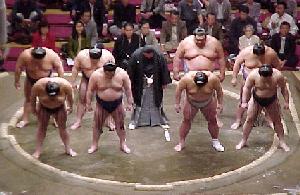 In Japan, social etiquette is very important. There is a very real emphasis placed on the ritual of daily living. As a missionary living in Japan, you will need to know the rules of social etiquette if you are to be an effective ambassador. The following are some traditional social rules in Japan.
In Japan, social etiquette is very important. There is a very real emphasis placed on the ritual of daily living. As a missionary living in Japan, you will need to know the rules of social etiquette if you are to be an effective ambassador. The following are some traditional social rules in Japan.
- It's considered proper behavior to act reserved and modest. Agressive tones are very offensive to Japanese.
- It's tradition for Japanese to bow when greeting each other. It is a show of respect. At Church, Japanese are accustomed to hand shaking, but it is not common place in Japan.
- The use of honorific speech (Keigo) is used by Japanese to show respect. It should always be used on new aquaintances, older people and those of high social status.
- The Japanese like to compliment others. As a new missionary, you will be complimented often for your efforts to speak Japanese. It is considered appropriate to deny the compliment.
- Japanese try to always be humble when dealing with others. They will demean themselves or their property. These kinds of comments are understood to be respectful and appropriate. Never agree with these self-demeaning comments. For example, a Japanese citizen may say his country is very narrow and you might respond by saying oh no, but it is very beautiful.
- The role of women in Japan is changing, but traditionally women have been subservient to men. A Japanese woman may feel uncomfortable if you offer her your seat on a bus or train, or it someone holds the door open for her.
- It's good etiquette to acknowledge a favor done by someone the next time they meet.
- Direct negative or forceful speech is viewed by the Japanese as being offensive. They will avoid saying no directly to refuse a request. They will also avoid direct personal questions to persons outside of their immediate family or close circle of friends.
- The Japanese receive things with two hands. They use the phrases itadakimasu (I humbly partake) or arigato gozaimasu (thank you).
Take our online Japanese Etiquette Quizand see you how well you did compared to others.
|
·
·
·
·
·
·
·
·
·
·
·
·
·
|
|
 In Japan, social etiquette is very important. There is a very real emphasis placed on the ritual of daily living. As a missionary living in Japan, you will need to know the rules of social etiquette if you are to be an effective ambassador. The following are some traditional social rules in Japan.
In Japan, social etiquette is very important. There is a very real emphasis placed on the ritual of daily living. As a missionary living in Japan, you will need to know the rules of social etiquette if you are to be an effective ambassador. The following are some traditional social rules in Japan.